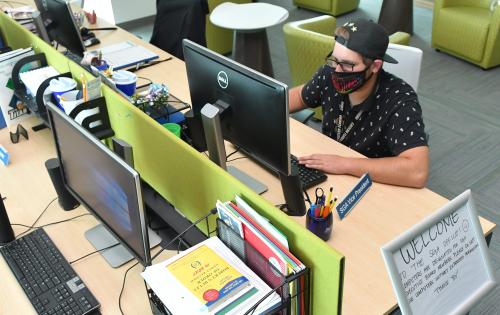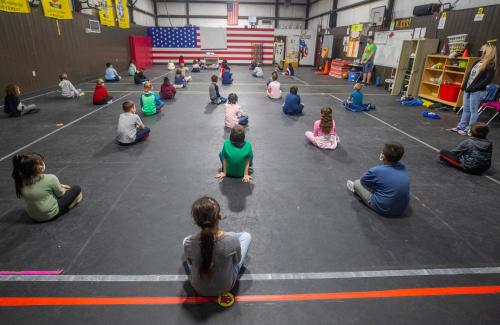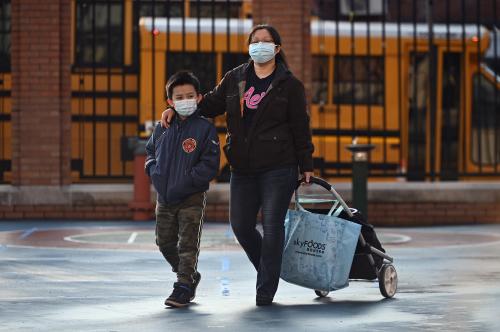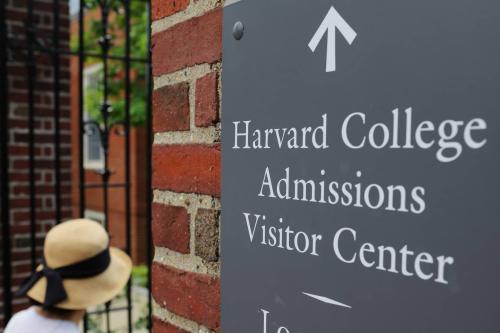Over 200 colleges and universities have closed in the United States due to the coronavirus pandemic. Some have canceled in-person classes for the rest of the spring 2020 semester, while others have canceled graduation. Universities are trying to make decisions in a fluid and unprecedented environment.
Professors and instructors face their own challenges as they adjust to fully online teaching. Most research activities have ceased operations, and professors and staff are juggling family responsibilities as they aim to homeschool their children during the quarantine. Below are recommendations for universities and professors during the COVID-19 pandemic.
Recommendations for universities
1. Pay all employees.
Universities that do not pay their employees are contributing to economic and social inequality, as well as exposing their employees to health risks. Universities are educating students to not only be competent in their selected major, but to be productive citizens who think about how their decisions impact others. Actions speak louder than all those university emails being sent. Dining, custodial, and landscaping staff deserve to be paid as they are the backbone of universities. Universities also need to be thoughtful about how to ensure that adjunct faculty have the resources to ensure students receive high-quality online instruction.
2. Return housing and meal fees to students.
If students cannot live and eat in an on-campus dorm, why should they be charged for it? First, students were forced to leave campus. Second, some students do not have a family home and depend on living on campus year-round. Consequently, students need the money for housing and food. Universities can provide refunds to students’ bursar accounts. This will allow students to access the funds quickly.
3. Form a COVID-19 task force.
Universities need to think through decisions instead of being so quick to react. In order to make the best-informed decisions, universities can form a task force of various constituencies at the university (including students and dining and custodial staff) to gain a pulse of various concerns and potential landmines. This will prevent universities from reneging on policy statements. Receiving the emails from the university, college/school, department, and research center is not useful. Instead, prioritize a landing page. University employees and students are overwhelmed. Stop trying to move at normal speed.
4. Give pass/fail with a grade option for students who want it.
Pass/fail takes into account the fact that students’ lives are disrupted. Some students still do not have all of their belongings, not to mention books. An optional grade choice gives students who want to receive a grade the ability to do so. Universities may decide to make students choose whether to receive a grade now or at the end of the semester. Both decision points have pros and cons.
5. Add a year to the tenure clock
Universities should add a year to the tenure clock of assistant professors. Not only do professors have to transition to online teaching, their research projects are disrupted. Many professors are at home attempting to write and homeschool their children. For many, research simply isn’t happening. Providing an extra year for tenure still doesn’t mean that someone can’t come up for promotion early, but a one-year extension reduces mental and emotional stress. While these dynamics may be acutely present for parents with young children, we cannot downplay the extent to which professors serve as caregivers for elderly parents and relatives.
Recommendations for professors and instructors
1. Embrace virtual learning
First, provide students with PowerPoint slides and lecture notes. Second, record lectures or do live lectures with recording during the regular class time. Professors might also record a podcast-style lecture for students to follow. Pre-recording can be beneficial for households prone to interruptions.
Recording lectures is important to ensure all students can have access. Some students may have to care for an elderly relative, provide child care for a younger sibling, or get a part-time job to make ends meet. Additionally, some students have to share technological devices with family members and shouldn’t be constrained to time limits.
Finally, professors should be mindful that their lectures could end up online. Certain outlets are asking students to record professors to “out them” for certain political and ideological views. Be mindful of this, but it should not stop you from providing students with academic literature backed by peer-reviewed science.
2. Hold virtual office hours
This is one great way to stay in touch with students. You can hold them at the regular time or a time most convenient for you. Most meeting platforms allow you to include multiple people and for people to join over the time of the meeting. And try to have fun. Change your background settings or spruce up your at-home work space with that plant from your work office that you care so much about.
3. Shorten assignments and be innovative
Give online assignments that can be graded in a more manageable and systematic way. It is important to give broad windows to submit assignments. For exams, make them open note/open book. How are you going to monitor it anyway? If a time limit is placed on assignments, students who are not properly prepared still will not do well, and those that do prepare will succeed.
While some may groan about multiple-choice tests, the size of the class matters. I teach large classes with 180 students as well as small graduate seminars with 10-20 students. Multiple-choice exams may be the most viable option for the large course. Obviously, I wouldn’t assign a multiple-choice exam to a graduate seminar. I would continue as normal, aim to hold live classes for discussion, and give the final paper assignment.
For assignments with research components, they aren’t really possible right now. Therefore, give a predictive assignment by asking students to develop hypotheses with existing literature. In my large race-relations course, one prompt would ask students: “Imagine a world where there was no racism. What would this world look like? If you had unlimited financial resources, how would you devise an experimental design to truly test for racial equity?” For those teaching more general courses, you might have students reflect on the importance of research and science during a pandemic and what they think the future might hold. Some of the most innovative ideas may come from college-aged people, despite their spring break shenanigans (which many professors probably would have done at 21 years of age).
On quarantine life
Overall, universities need to make some hardline, informed decisions to provide stability to faculty, students, and employees. Professors need to be malleable. If everyone is understanding and reflective of the role of the other, we can hopefully (in the years to come) remember that higher education in spring 2020 was salvaged as universities and professors adapted to the COVID-19 pandemic.






Commentary
8 recommendations for universities and professors during the coronavirus pandemic
April 3, 2020